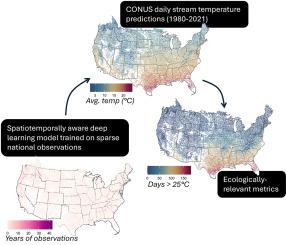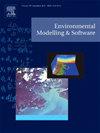使用时空感知机器学习算法评估美国相邻地区的日流温度预测(1979-2021)
IF 4.6
2区 环境科学与生态学
Q1 COMPUTER SCIENCE, INTERDISCIPLINARY APPLICATIONS
引用次数: 0
摘要
河流温度控制着各种影响生态系统、人类健康和经济活动的物理和生物过程。我们使用42年(1979-2021)的数据,使用循环图卷积网络预测美国邻近地区50,000条河流的河流温度的每日汇总统计数据。我们全面记录了所有河段和河流类型(例如,水库或地下水影响)的性能,作为未来改进的基准。该模型的水平RMSE为<;2°C,预测区间为90%,其中包含90.7%的观测值。我们还评估了该模型如何捕捉生态相关指标的变异性(例如,年7天最大值的R2 = 0.76;超过25°C的天数的R2 = 0.75)。由于输入集有限,该模型并不优于最先进的机器学习成果(例如,RMSE≤1.5°C),但确实提供了迄今为止空间最完整的建模来支持水资源可用性评估。本文章由计算机程序翻译,如有差异,请以英文原文为准。

Evaluation of daily stream temperature predictions (1979–2021) across the contiguous United States using a spatiotemporal aware machine learning algorithm
Stream temperature controls a variety of physical and biological processes that affect ecosystems, human health, and economic activities. We used 42 years (1979–2021) of data to predict daily summary statistics of stream temperature across >50,000 stream reaches in the contiguous United States using a recurrent graph convolution network. We comprehensively documented the performance – both across all reaches and by stream type (e.g., reservoir or groundwater influence) – as a baseline for future improvement. The model showed reach-level RMSE of <2 °C with 90 % prediction intervals that contain 90.7 % of observations. We also assessed how the model captured variability in ecologically relevant metrics (e.g., R2 for annual 7-day maximum = 0.76; R2 for days exceeding 25 °C = 0.75). This model does not outperform state-of-the-art machine learning efforts (e.g., RMSE ≤1.5 °C) due to a limited input set but does provide the most spatially complete modeling to date to support water availability assessments.
求助全文
通过发布文献求助,成功后即可免费获取论文全文。
去求助
来源期刊

Environmental Modelling & Software
工程技术-工程:环境
CiteScore
9.30
自引率
8.20%
发文量
241
审稿时长
60 days
期刊介绍:
Environmental Modelling & Software publishes contributions, in the form of research articles, reviews and short communications, on recent advances in environmental modelling and/or software. The aim is to improve our capacity to represent, understand, predict or manage the behaviour of environmental systems at all practical scales, and to communicate those improvements to a wide scientific and professional audience.
 求助内容:
求助内容: 应助结果提醒方式:
应助结果提醒方式:


